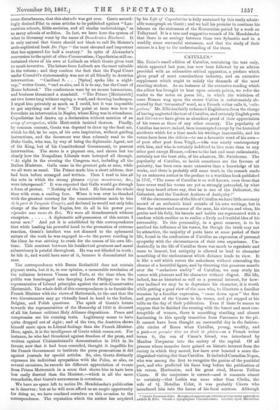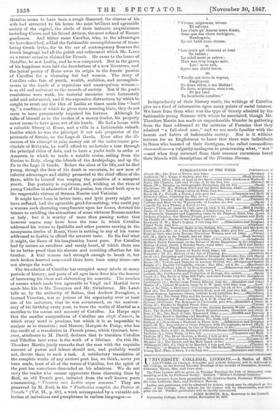CATULL US.*
Mn. ELus's small edition of Catullus, containing the text only, which appeared last year, has now been followed by an edition provided with an exhaustive critical apparatus, a preface which gives proof of most conscientious industry, and an excursive supplement which ought to satisfy the demands of the most exacting student. As an instance of the extensive reading which the editor has brought to bear upon minute points, we refer the reader to the notes on poem liii., in which the witticism of some Roman wag upon the orator Calvus is unfortunately ob- scured by that ' tormented' word, as a French writer calls it, sala- putium.' Mr. Ellis has fairly redeemed Englishmen from the charge of having neglected the text of Catullus, and certainly English poets and litterateurs have given as abundant proof of their appreciation of his verses as those of any other country. The popularity of Catullus has never, indeed, been interrupted except by the historical accidents which for a time made his writings inaccessible, and his verses have been the delicin—to use a favourite word of his own— of poet after poet from Virgil,—who was nearly contemporary with him, and who is certainly indebted to him more than to any other poet except Homer,—down to the last and most enthusiastic, certainly not the least able, of his admirers, Mr. Swinburne. The popularity of Catullus, so lavish sometimes are the favours of posterity, has been even more extensive than a knowledge of his works, and there is probably still some truth in the remark made by an unknown author in the preface to a worthless book published in 1707, " The name of Catullus is so well known, even those that have never read his verses are yet so strongly persuaded, by what they have heard others say, that he is one of the. Delicatest, the- Gilantest, and the Tendrest Authors of Antiquity 1"
Of the circumstances of the life of Catullus we have little accessory record of an authentic kind outside of his own writings, but in these the nature and manner of the man, his virtues and vices, his genius and his folly, his haunts and habits are represented with a candour which enables us to realize a lively and truthful idea of his personality. To this personality, in a great measure, is to be ascribed the influence of his verses, for though the truth may not be attractive, the majority of poets have at some period of their life, found in the confessions of Catullus an expression of personal sympathy with the circumstances of their own experience. Un- doubtedly in the life of Catalina there was much to reprobate and more to lament, but antiquity is allowed to lend to character something of the enchantment which distance lends to view. It is like a veil which covers the nakedness without concealing the charms of a beautiful figure, and by throwing this generous mantle over the " audacious nudity" of Catullus, we may study his verses with pleasure and his character without disgust. His life, indeed, has an historical as well as a personal interest, for how- ever inclined we may be to depreciate his character, it is worth while getting a good view of the man who, to illustrate a familiar occasion by a familiar expression, "came down upon" the first and greatest of the Caesars in his verses, and yet supped at his table on the day of their publication. Even if there be reason to. suppose that he finished the evening with the basest and most con- temptible of women, there is something startling and almost fascinating in this speedy transition from Parnassus to the pit. It cannot have been thought an uneventful day in the fashion- able circles of Rome when Catullus, young, wealthy, and a poet—ce premier titre au droit de plaire—as a French writer terms it, the son of Caesar's friend, was introduced by Manlius Torquatus into the society of the capital. Of all persons whose memoirs have gained an historic interest from the society in which they moved, few have ever boasted a more dis- tinguished visiting-list than Catullus. It included Cornelius Nepos, who was among the first to recognize the genius of the youthful poet, and who predicted his fame long before the publication of his verses, Hortensius, and his great rival, Marcus Tullius. Cicero. If the conjecture is correct—and it amounts almost to certainty—that Lesbia was none other than Clodia, the wife of Q. Metellus Celer, it was probably Cicero who. introduced him into the house of his fatal mistress. Although
Critidlt Veronensis Liber. Recognovit apparel= critlenm prolegomena appendices addidit 8. Ellis. Oxonil a typographeo Clarendonisno. Londhli, spud Macmillan
Metellus seems to have been a rough diamond, the charms of his wife had attracted to his house the most brilliant and agreeable society of the capital, the circle of their intimate acquaintance including Cicero and his friend Atticus, the most refined of Roman gentlemen. And hither came Catullus, who, to the advantages we have described, added the fashionable accomplishment of trans- lating Greek lyrics, for to the ear of contemporary Romans the Greek language had all the polish and refinement which Mr. Lowe on a recent occasion claimed for French. He came to the house of Metellus, he saw Lesbia, and he was conquered. But in the grave of his happiness were laid the foundations of a new literature, and the lyrical poetry of Rome owes its origin to the frantic passion of Catullus for a charming but bad woman. The story of Catullus —the fate of youth, wealth, ambition, and accomplish- ments in the hands of a capricious and unscrupulous woman— is as old and universal as the records of society. But if the poet's resolutions were weak, his material resources were fortunately solid and substantial, and if the expensive distractions by which he sought to crush out the idea of Lesbia at times made him "hard up," a condition of which he gives some amusing hints, they do not seem to have permanently impaired his fortune. Although he talks of himself as in the meshes of a money-lender, his property never seems to have gone out of his hands. He had a house with a valuable library at Rome, and a villa in a fashionable suburb, besides which he was the principal if not sole proprietor of the peninsula of Sirruio, on the Lago di Garda. Even after the ill- success of his attempt to raise money out of the unfortunate pro- vincials of Bithynia, he could afford to undertake a tour through the principal cities of Asia, and to have a yacht built to order at Amastris, in which he made a notable cruise, sailing from the Euxine to Italy, along the islands of the Archipelago, and up the Po to the Lago di Garda. Before the close of his life, and he died young, though the date of his death is uncertain, he saw men of inferior advantages and ability promoted to the chief offices of the State, while he himself was reaping the penalties of a misspent youth. But posterity is capricious, and, winking at the vices of young Catullus in admiration of his genius, has closed both eyes to
the respectable virtues of Struma Nonius and Vatinius. • It might have been in better taste, and lyric poetry might not have suffered, had the agreeable good-for-nothing, who could pay a woman such charming compliments upon her kisses, devoted his leisure to extolling the attractions of some virtuous Roman maiden or lady, but it is worthy of more than passing notice that however coarse may have been the tone in which Catullus addressed his verses to Ipsithilla and other persons moving in the anonymous circles of Rome, there is nothing in any of his verses addressed to Lesbia to offend the severest taste. Be the fuel what it might, the flame of his imagination burnt pare. For Catullus had by nature an excellent and manly heart, of which there can be no better proof than his sincere and touching affection for his brother. A frail woman had strength enough to break it, but such broken-hearted men—and there have been many since—are not always the worst.
The translation of Catullus has occupied many minds at many periods of history, and poets of all ages have done him the honour .of borrowing his ideas and elaborating his conceits. The touches of nature which made him agreeable to Virgil and Martial have made him kin to Mr. Tennyson and Mr. Swinburne. Mr. Lamb tells us, by the authority of Balzae, that Andrew Navagiero, a learned Venetian, was so jealous of his superiority over at least one of his imitators, that he was accustomed, on the anniver- sary of his birthday every year, to burn the works of Martial as a sacrifice to the manes and memory of Catullus. La Harpe says that the smaller compositions of Catullus are chefs d' ceuvre, in which every word is precious, but which it is as impossible to analyze as to translate ; and Masson, Marquis de Pezay, who has the credit of a translation in French prose, which Querard, how- ever, attributes to M. David, declares that to translate Catullus and Tibullus into verse is the work of a lifetime. On this Mr. Theodore Martin justly remarks that the man with the requisite amount of power and leisure should not, and probably would not, devote them to such a task. A satisfactory translation of the complete works of any ancient poet has, we think, never yet been made, least of all of the verses of Catullus, but the spirit of the poet has sometimes descended on his admirers. We do not envy the reader who cannot appreciate those charming lines by Balf, an old French poet, imitated from the well known poem commencing, " Remus mea Lesbia atque amemus." They are preserved by M. Noel, iu his " Traduction complete des Polities de Catulle" (Vol. II., p. 60), a work accompanied by a valuable col- lection of imitations and paraphrases in various languages:—
I.
" Vivons, mignonne, vivons Et suivons Les dbats qu' Amour nuns donne,
Sans que des vienx reohign6a,
Renfrogn6s, Le sot babil nous stone.
If.
"Les jours qui viennent at vont Se refont ; Le soleil wort se releve Mais une trop longue suit, Las ! none suit, Apres une elart6 breve.
m.
" Tandis que nous la voyens, Employons Ce dons. vivre, b ma Melina! Ca done, mignonne, vion-t-en, Et me tend To bouchette coraline."
Independently of their literary merit, the writings of Catullus give us a fund of information upon many points of social interest. We learn from them what was the type of beauty admired by the fashionable young Romans with whom he associated, though Mr. Theodore Martin has made an unpardonable blunder in gathering from the lines addressed to the mistress of Formian that they admired " a full-sized nose," and we are made familiar with the haunts and habits of fashionable society. Nor is it without interest for an Englishman to know that there were individuals in Rome who boasted of their hintrig,nes, who called commodious chammodious—a vulgarity analogous to pronouncing what, " wot " —and when they returned from their summer excursions bored their friends with descriptions of the Hionian //ocean.



































 Previous page
Previous page